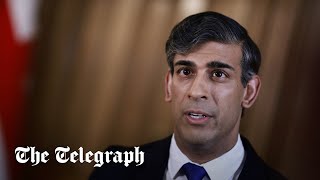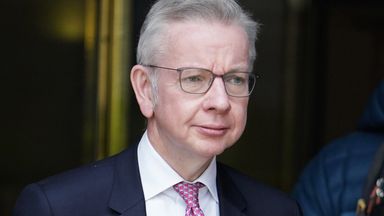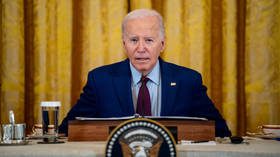Rishi Sunak said “everyday challenges” in life should not lead to people being signed off work sick as he unveiled a five-point plan to tighten the welfare system.
In an interview with The Telegraph – published in full below – the Prime Minister said people with mild mental health conditions should be given help to stay in work rather than being written off from employment.
He also proposes that unemployed people who refuse to take a job will lose their benefits after a year, toughening a previous plan to give them 18 months.
Benefits claimants who work less than 18 hours a week, up from 15 hours at present, face spending more time with a job coach. Ministers said the change to the threshold, combined with a previous increase from 12 hours, would see 400,000 more people given “intensive” help to find more work.
To tackle the rise in long-term sickness, Mr Sunak announced that the power to sign sick notes would be stripped from GPs and handed to “objective” assessors.
The Covid pandemic has fuelled a surge in the number of people inactive because of long-term sickness. It stands at a record 2.8 million, up from 2.1 million before the virus struck.
Mr Sunak unveiled the plans, which he has described as a “moral mission”, in a speech on Friday. In his interview with The Telegraph afterwards, he said: “This is about making sure that the welfare system doesn’t over-medicalise what are the everyday challenges and anxieties of life.”
The Prime Minister said he “entirely” rejected the argument that his approach amounted to not being caring enough to people with mental health concerns.
He argued that changing the benefits system to encourage people to remain in work where possible, rather than being signed off long-term, was the right approach.
On Friday, the International Monetary Fund warned that Britain’s worklessness crisis was hurting the economy and risked permanently damaging growth.
Meanwhile, the Institute for Fiscal Studies think tank found there are now 4.2 million working-age individuals receiving at least one health-related benefit. That amounts to 10 per cent of all working age adults and is up from 3.2 million, or eight per cent, in 2019 before Covid hit.
‘Work gives you a sense of belonging and pride’
Within a few minutes of talking to Rishi Sunak about his “moral mission” to get Britain working again, it becomes clear that it is underpinned by deep personal conviction.
Speaking to The Telegraph after a speech outlining his five-part welfare reform drive, the Prime Minister appears energised.
“I believe deeply in the value of work,” he explains. “I think work gives you purpose, it gives you meaning, it gives you a sense of belonging and pride.
“In life, you don’t get anywhere without hard work – whether that’s you as an individual, whether that’s your family or us as a country. I don’t want us to ever lose sight of that.”
That belief can partly be traced to Mr Sunak’s upbringing, to which he makes reference during the interview, with his pharmacist mother and GP father in Southampton.

Number 10 insiders often say that if you want to understand Mr Sunak’s approach to politics, then his parents’ determined work ethic – in part to put him through private schooling – has to be appreciated.
The emphasis on the value of work is something he believes has been a theme of his career in government. “This is something that I’ve spoken about for years,” he says. “When I created the furlough scheme, I talked about the importance of work.”
The focus in the last 18 months on tax cuts designed to encourage job creation – business incentives and National Insurance reductions rather than, for example, inheritance tax cuts – would be another point on his list.
“This is something that I believe – it’s how I was raised,” he says. “This reflects my long-standing view that work is really central to one’s life.”
In his speech, the Prime Minister sounded the alarm about the surge in people being signed off as too sick to work since Covid struck, often citing mental health concerns.
His policy prescriptions include getting people other than GPs to issue sick notes, removing benefits from people who stop looking for work after a year of unemployment, and proposing support other than financial for people whose mental health problems are deemed to be relatively mild.

One common critique has already emerged – that he does not care enough about mental health concerns. Is there some truth in that?
“I reject that entirely,” he responds. “It’s actually because I specifically do care about mental issues that I’ve thought long and hard about this and how to get this right. This is about making sure that the welfare system doesn’t over-medicalise what are the everyday challenges and anxieties of life.
“Of course people with depression or anxiety should get the treatment and the support they need. But we can’t assume that just because you have these conditions, particularly when they’re less severe, that you just are not expected to engage with the world of work. That’s not right. We have to change that.”
Mr Sunak has often talked how being a parent – he has two daughters, Krishna, aged 12, and Anoushka, 11 – has shaped his policy thinking on issues such as vapes, phone use and crime.
He used his speech to note the rise in young people citing mental health problems, praising the way discussion of such topics is now more accepted.
Does his family discuss such things? “People do that in every family,” he says. “I said very clearly that anyone who themselves has suffered from mental health or has family and friends who have, as I have, as I’m sure many of us have, knows that these are very real conditions and have a real impact on people. No one is taking anything away from that, certainly not me.
“The biggest proportionate increase in inactivity we’ve seen is amongst young people. That’s a tragedy. It’s an enormous waste of human potential. I don’t want that to carry on. I want to change that.”
As is the way when a political party is around 20 percentage points behind its main opponent with a general election looming, Mr Sunak faces grumblings from some Tory colleagues.
Some complain that he is not doing enough classically conservative things – the phased smoking ban, which passed its first vote this week, being a recent example.
Certainly, some of the voters fuelling the polling surge by Reform UK, the Right-wing party of Richard Tice and Nigel Farage, are disillusioned Tories. What is Mr Sunak’s message to those flirting with voting for Reform?
“A vote for anyone who’s not a Conservative is just going to put Keir Starmer in Downing Street,” the Prime Minister says, urging people who have left the Tories since the last general election to return.
“I get that people are frustrated. I’m frustrated, and I’m working very hard to resolve things and make life better for people.
“But if you’re someone who cares about cutting taxes, if you’re someone who cares about cutting the costs of net zero and if you’re someone who cares about stopping the boats, then why on Earth would you want to see Keir Starmer as prime minister?
“He doesn’t care about any of those issues. I do. Not only do I care about those issues and share your values on those issues, I’m actually doing something about all of them.”
He places taking a tougher approach to the soaring welfare bill – £69 billion is now spent on benefits for working age people with disability or health conditions, more than the schools budget or transport budget – squarely in the bracket of traditional Tory ideology.
And then there are mutterings – surfacing, as ever, via anonymous sources in a few recent media reports – that the Prime Minister is self-critical or even self-doubting with the polls not budging.
Has he ever considered stepping down and letting someone else lead the party into the election? “No,” he says. “I am not focused on those things. I’ve always been very clear that the poll that matters is the general election.
“There will be hundreds of polls between now and then. What I’m focused on is working every hour that God sends to deliver for the British people.”
So Mr Sunak really thinks he can win the next election? “Absolutely,” he declares. “The choice at the general election is crystal clear.
“Stick with this plan that is working, that is delivering change on the things that Telegraph readers and the country care about – cutting their taxes, controlling migration, cutting the cost of net zero, reforming the welfare system. That’s what we’re delivering. That’s the choice at the next election.”
Whether or not the electorate agrees will determine whether Mr Sunak gets the time to turn his new “moral mission” into a reality.
Disclaimer: The copyright of this article belongs to the original author. Reposting this article is solely for the purpose of information dissemination and does not constitute any investment advice. If there is any infringement, please contact us immediately. We will make corrections or deletions as necessary. Thank you.



